Skip To Section
A ranch horse is a horse of any breed that is capable of efficiently completing the tasks that are required of it on a working ranch; such a horse is also confident with a rope around him and comfortable with cattle. These animals are obedient, attentive, quiet, and highly athletic.
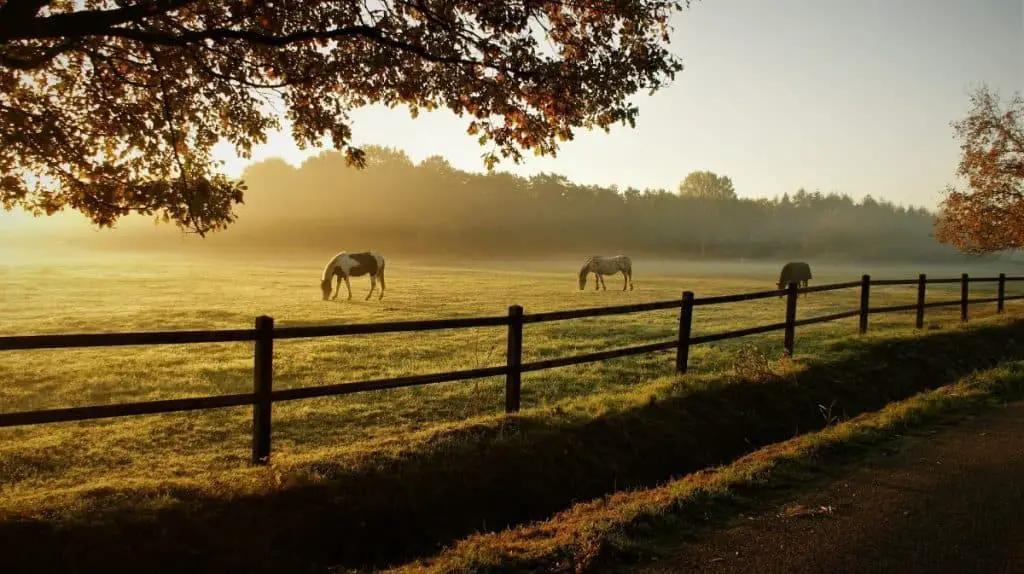
Are there specific breeds that make a good ranch horse? What is a ranch horse show and how much does such an animal cost?
Let’s find that out!
What Makes A Good Ranch Horse?
When talking about an ideal ranch horse, experts have a truly versatile animal in mind.
- A good ranch horse is obedient in nature, attentive, quiet, and highly athletic.
- He can spin, perform a sliding stop, and roll back.
- The horse is able to efficiently complete the tasks that are required of it on a working ranch.
- Such horses can stay balanced, accurately change leads, and go forward at different speeds.
- The best ones can safely drag items with a rope and pass over obstacles.
- Ranch horses have to be able to stay quiet when they are asked to.
- These animals are capable with cattle and can work a cow (separate it from a herd and send it in any direction).
- The horse and rider should also be able to use the bodyweight to stop and hold the cow after the rider had caught it.
- Finally, a good ranch horse is a rope horse.
The Diet Of A Ranch Horse
To ensure optimal health and performance, working ranch horses have to be fed adequately.
Here is an example of a feeding program for an 1100 lb horse in moderate work:
15-17 lbs of Alfalfa/grass hay
5-7 lbs of oats
1 oz of 18:18 mineral (1:1 livestock mineral)
Trace-mineralized salt (with iodine)
How Much Does A Ranch Horse Cost?
The main factors that affect the price of a horse include:
- Age
- Breed
- Height
- Sex
- Color
- Conformation
- Bloodlines
- Temperament
- Potential
- Who is selling the horse
- Location
- The economy
According to Mike Samples from Farmers; Ranchers Livestock Sale in Salina, a good ranch horse would cost you anywhere between $10.000 and $15.000. Moreover, $10.000 is now seen as the new bottom for the market, so you can’t really expect to find anything cheaper.
Tip: growing a horse to maturity can be extremely expensive. If you can, buy a mature horse that has already been raised by professional breeders.
In 2008, the economic crash affected the horse business as well. A lot of people gave up their dreams and sold their animals off.
Not as many horses were bred back then. But those that have been are reaching their prime right now.
As a consequence, there is a shortage of mature horses at the moment. Moreover, there aren’t too many people who can raise a great horse – all these things have drastically affected the prices.
Tip: training expenses should also be taken into consideration. Leave the training process to the expert to ensure the best results.
Experts believe that in 10 years today’s prices are going to sound cheap. Even nowadays, a lot of riders are ready to pay over $50,000 for a good horse.
They believe that it’s easier to pay a higher price and sleep in peace knowing that the cash is safe on a good one.
Rules For Buying A Ranch Horse
Do Your Research.
Get to know more about the people who you are buying from. Ideally, it would be someone who had been in business for many years and who will always tell you the truth about the horse (both good and bad).
Arrive at the sale…the day before. Take your time, select a few horses to bid on, and talk to the ranch owners.
Find out more about the person who rides or trains the horse.
Ask the past buyers what do they think about the overall experience with the seller.
Don’t Go For The Looks.
The pretty horses are usually the most expensive ones. Focus on what you’re looking for – a good ranch horse might not be the prettiest, but you need one with a good mind and that is capable of getting the job done.
Tip: you might get a great deal on a less colorful horse. A buckskin, for example, will, most likely, cost you much more, so why not go for the sorrel?
Keep It Cool.
Set a price limit for yourself, so no matter what happens, you can’t go over a certain sum. Sometimes it might be easy to lose it in the heat of the moment.
Remember that sometimes the ‘logical’ price ranges don’t matter at all. The value of a horse is very subjective and it all depends on the ranch.
What Type Of Horses Are Used On Ranches?
Even though any horse that can perform some routine tasks on a ranch can be called ‘a ranch horse’, there are some common breeds that a lot of ranch owners choose to go for.
1. Mustang
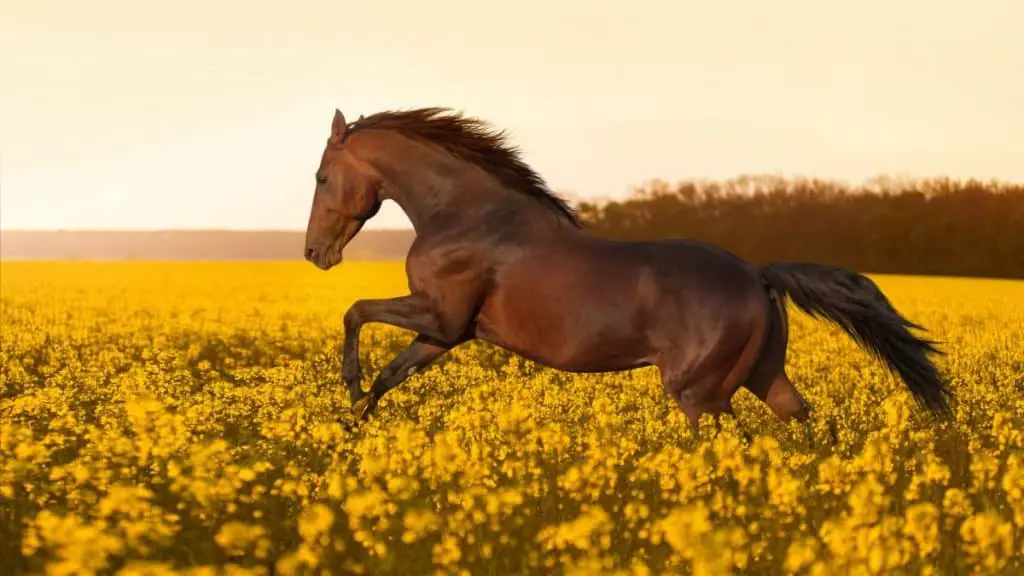
Did you know that many wild mustang herds were formed from ranchers?
These horses are able to travel long distances and can easily navigate rough terrain. Two great qualities that make a very good ranch horse.
2. Quarter Horse
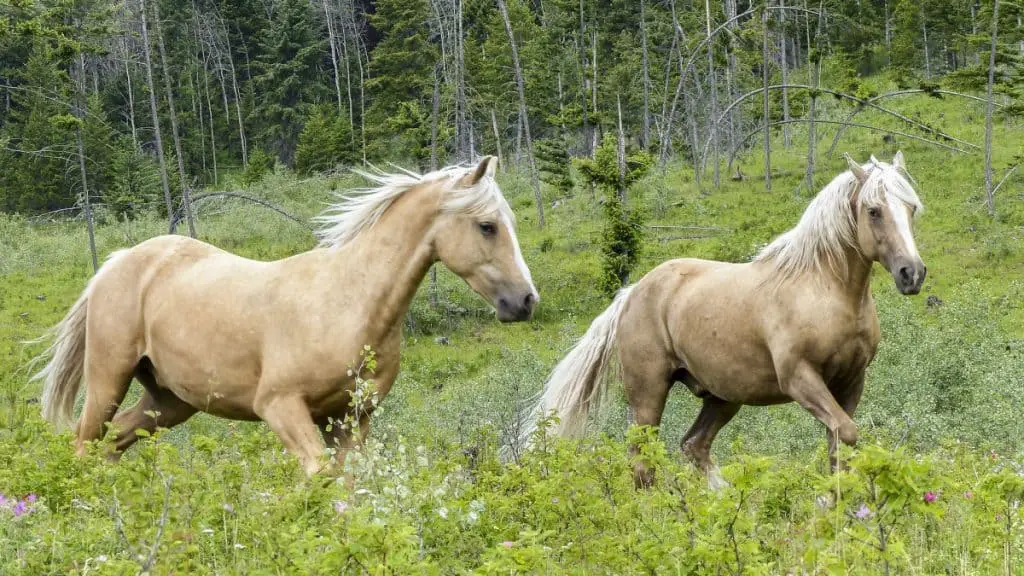
Not only a symbol of the west but also, probably, the best ranch horse you’ll ever find.
The breed was actually formed by ranchers who wanted to bring the best qualities of different horses together.
They are quiet enough and fast enough. Moreover, Quarter Horses can hold the end of the rope, chase after livestock, and are good cutting horses.
3. Appaloosa
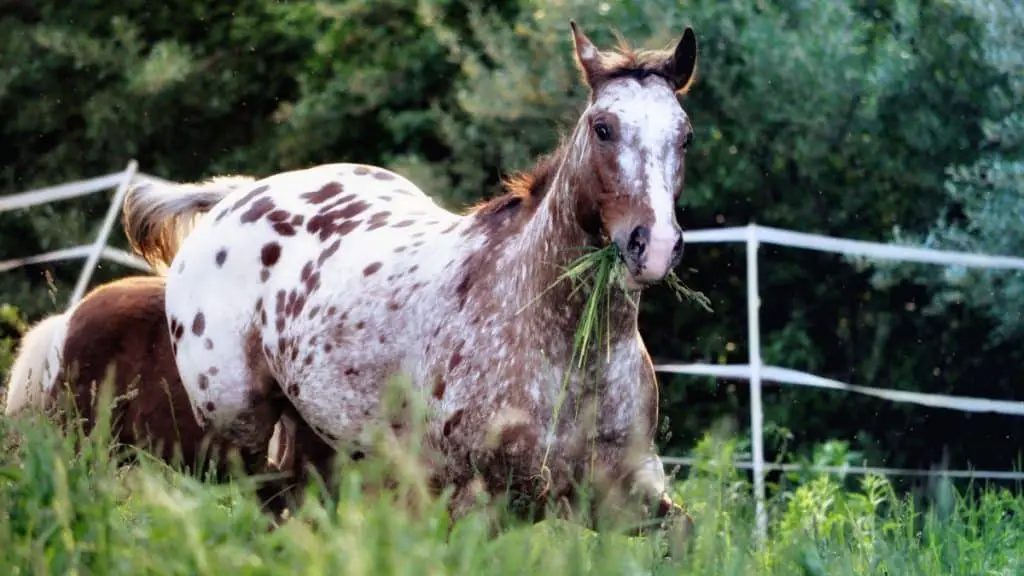
Appaloosas crossed with Quarter Horses make amazing ranch horses.
However, foundation Appaloosas are also great at holding a cow and working the gate.
4. American Paint Horse
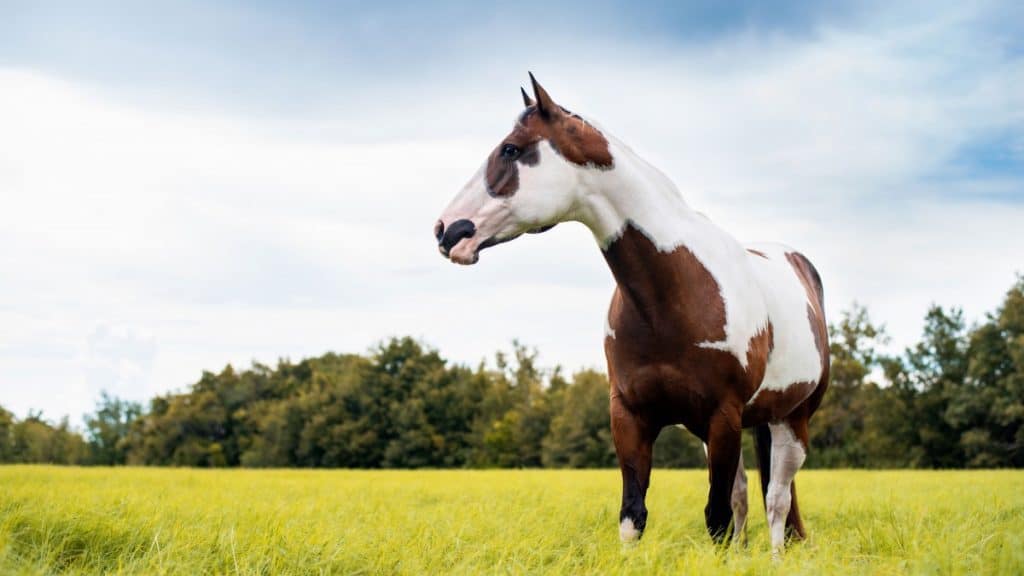
For anyone who values both performance and color, an American Paint Horse might be the right choice.
The animal can excel at any task it might be given on a ranch.
5. Mule
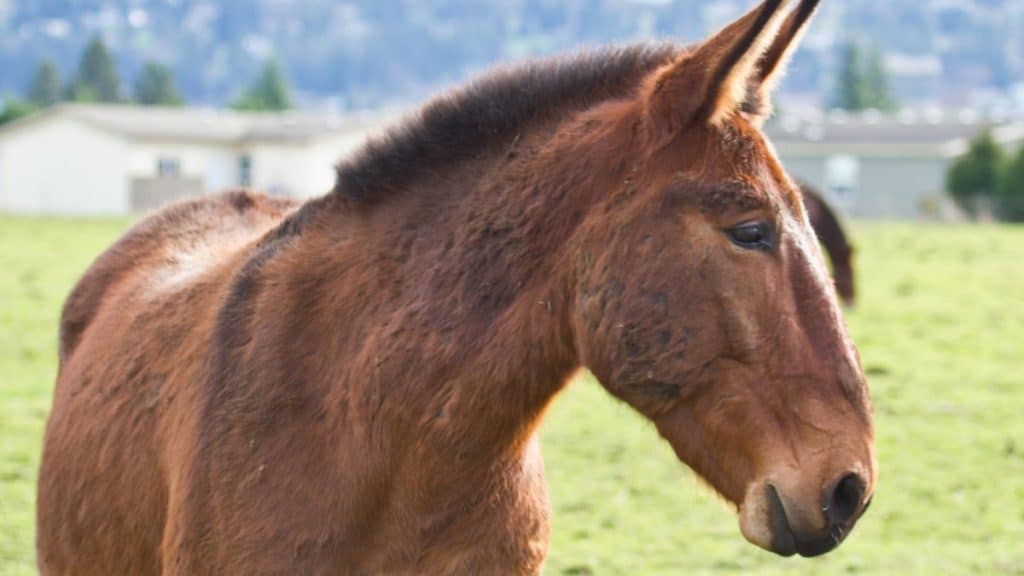
Even though mules are not a breed of horse, they make spectacular helpers on the ranch.
A lot of the qualities would certainly depend on the breeding, but if a mule had a Quarter Horse mom, he would be able to cut a cow and work a rope.
However, do bear in mind that only some horsemen are able to train a mule.
6. Morgan Horse
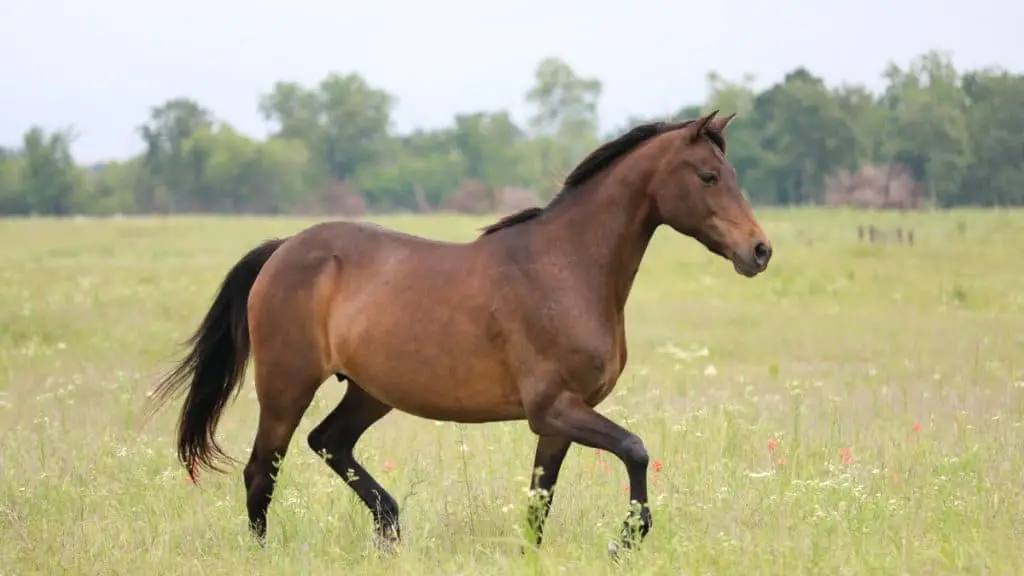
There are various bloodlines that excel in different disciplines.
This versatile horse might be able to pull a buggy and do ranch chores, but there are certain Morgan Horses that are amazing particularly in ranch work.
The Top 5 Ranch Horse Bloodlines
For over a century, ranchers have been breeding horses to come up with the perfect working ranch horse.
Starting from the late 1800s, legendary stallions were produced. By the way, they were the horses to become the foundation sires for a whole breed – the Quarter Horse.
Let’s have a quick look at the most popular bloodlines that had an enormous influence on the working strings that we see today.
Little Peppy
A 1974 sorrel stallion that won the NCHA Futurity when he was 3. This outstanding horse had a smooth trot and he always studied what you were doing.
Little Peppy is linked to the legendary King Ranch.
Doc Bar
The thousand-pound chestnut stallion had an incredible cow sense, was graceful and athletic. No wonder the horse’s blood is popular today with ranch-horse breeders.
Joe Hancock
Hancock-bred horses are appreciated by ranchers, ropers, and rodeo competitors. Experts say that there are only a few bloodlines that are able to produce such hardworking horses.
Driftwood
In the 1930s, Driftwood dominated in the rodeo arena. Later on, he also became a well-known rope horse.
Today, this respected bloodline of stunning ranch and rodeo horses is known for its intelligence and speed.
Are Ranch Horses Well-Suited For The Trail?
If there is ever such a need, ranch horses can become great trail partners.
Such horses have learned to conserve energy, so, the majority of them can handle distant, challenging trails.
Ranch horses are good at following active leadership. At the same time, on the trail, you wouldn’t have to control every move of the animal – the independent horses can self-manage, but will listen whenever you direct them.
Moreover, ranch horses have mastered the principles of safe riding and they already trail-ride every day as they drag steers and work cattle.
It might come as a surprise to some, but considering all the facts mentioned above, an experienced ranch horse can make a lovely trail horse (in case it has a good temperament, of course).
What Are Ranch Horse Classes?
The six classes in Versatility Ranch Horse include Ranch Trail, Ranch Riding, Working Cow Horse, Ranch Cutting, Ranch Reining, and Ranch Conformation.
Ranch Trail contains a course with at least 7 obstacles (the mandatory ones include ground tying, a log drag, and a gate). The horse’s willingness and correctness at the walk, lope, and trot are judged.
Ranch Riding is an individual pattern. It shows the horse’s ability to move at a working speed with a rider (at the trot, lope, and walk). The emphasis is on smooth transitions.
Working Cow Horse is a class that combines boxing the cow, taking it down the fence and turning it both ways, roping it, and then bringing the horse to a stop.
Ranch Cutting is where the horse’s ability to separate a cow from the herd will be judged. The cow should be held away from the herd and then the horse would have to pen the cow or cut another one.
Ranch Reining measures the ability of the horse to perform basic handling reining pattern maneuvers (can be held with the Working Cow Horse class).
Ranch Conformation is the ability of the horse to perform a ranch task. It is based on balance, functional, and structural correctness.
What Is Ranch Horse Competition?
The Versatility Ranch Horse Competition allows ranch horses to demonstrate their abilities in the six classes mentioned above.
The American Quarter Horses Association’s Competition was made specifically for this horse breed.
There are four different divisions:
- Open – anyone with a membership can show his horse in an open competition. The classes may be offered for both senior and junior horses.
- Amateur – this is the right division for anyone who does not join the professional ranks.
- Youth – this one is suitable for the exhibitors who are 18 years of age or younger.
- Cowboy – the division is only for working ranch cowboys. If the rider is either a family member, an owner, or a full-time employee at a ranch that owns the horse, he can compete.
The points that have been earned in the classes count toward qualifying for the World Championships.
What Is A Ranch Horse Show?
The shows value and promote a truly versatile ranch horse.
There are a variety of classes offered, starting from Showmanship and ending with Ranch Reining.
Some of the most popular point penalties in the Showmanship Score Sheet include: break of gait at a walk or jog for 1 stride, sliding or lifting pivot foot and replacing in the same place, stopping too close/far from the judge, changing hands on the lead except to show teeth, horse stopping crooked or drops hip when stopping, and many others.
To Sum Up
In this article, we have shared with you all the information you need to know.
Not all horses make good ranch horses. In fact, only well-trained animals with the right temperament and great physical abilities can become amazing helpers.
Even though, throughout the last few years, the prices for horses have gone up, investing in one might become one of the best decisions of your life.
We have mentioned above a few outstanding bloodlines that you can choose from. However, if you decide to go for another breed, you can still end up with a very good horse.
There are special ranch horse competitions and shows where you can try your luck and showcase the horse and its abilities.
Moreover, if there is ever such a need, ranch horses can make incredible trail partners.
